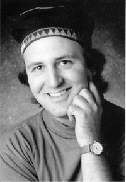A World of Difference
Yesterday finished reading Tom Clark's biography of Ed Dorn, titled Edward Dorn: A World of Difference. I've already loaned it to a young friend who probably needs a model of someone who steadfastly did not fit in to any academic setting, at least until he was forty or so years old (Dorn).
It's a very odd biography, beginning in the late 1960's with Dorn (and Clark) in England at the Univ. of Essex, both there in some way through the vision of Donald Davie, both at a time of life change — for Dorn, the breakup of a fairly long marriage and the beginning of the relationship with Jenny that would last the rest of his lifetime (he died in December 1999). This time provides a reminder of how Dorn did not fit into an academic setting, as well as a siting of a radical agenda on campuses in France, where he went to see what was going on, returning to Essex to take side with radicals there, a decision that put him at odds with Davie.
Clark's life of Dorn then begins again at Dorn's beginning, continuing forward, but it mostly provides glimpses of specific instances that it connects to themes or methodologies in Dorn's writing, particularly beginning from landscape, which to Dorn, following Carl Sauer's "The Morphology of Landscape," is always the totality of what is present in the landscape, thus includes the land, the people and life thereon, its history, geology, economics, and much more. Clark provides a continuing series of such moments, paralleling, as he argues, what is a primary methodology of Dorn's writing, i.e. locating in place, and moving concentrically out and back in from that location, something that can be done in a very physical sense, as well as in social, economic, psychological, or other senses.
By doing so, Clark gives us a pretty good sense of what Dorn is about in an overall way, yet it feels like details are missing. Poems are looked at as evidence of Dorn's take on the landscape, not often in a more total sense of the evidence the poem itself presents. And much of the biography, its details, Dorn's relationships with others, etc., is missing. Also, except for that beginning period of 1966-67, the book's chronology stops in 1959 (except for the epilogue), leaving out nearly forty years of Dorn's life, including the writing of *Gunslinger* and the late poetry. Speaking as one who knew Dorn, although not as well as I would have liked, I don't feel the gracious and determined presence of Dorn in this book, not as I remember speaking to him, or reading his few welcome notes to me over the years. The one exception to this is the Epilogue, which treats the last two and a half years of Dorn's life, when he was dying of cancer. Here Clark mostly lets Dorn himself speak through journal entries, poems, and letters. Here Clark as organizer of the material is at his most generous and enabling.
I don't mean to knock the book too much. It's fascinating to read this poet's life, and the immense difficulties of its first three decades, a hard-scrabble life well below middle or working class. It's a good book, and its subject is fascinating, a poet like no other I've ever read. I just hope an even better and more complete biography comes out somewhere down the proverbial road.


0 Comments:
Post a Comment
<< Home